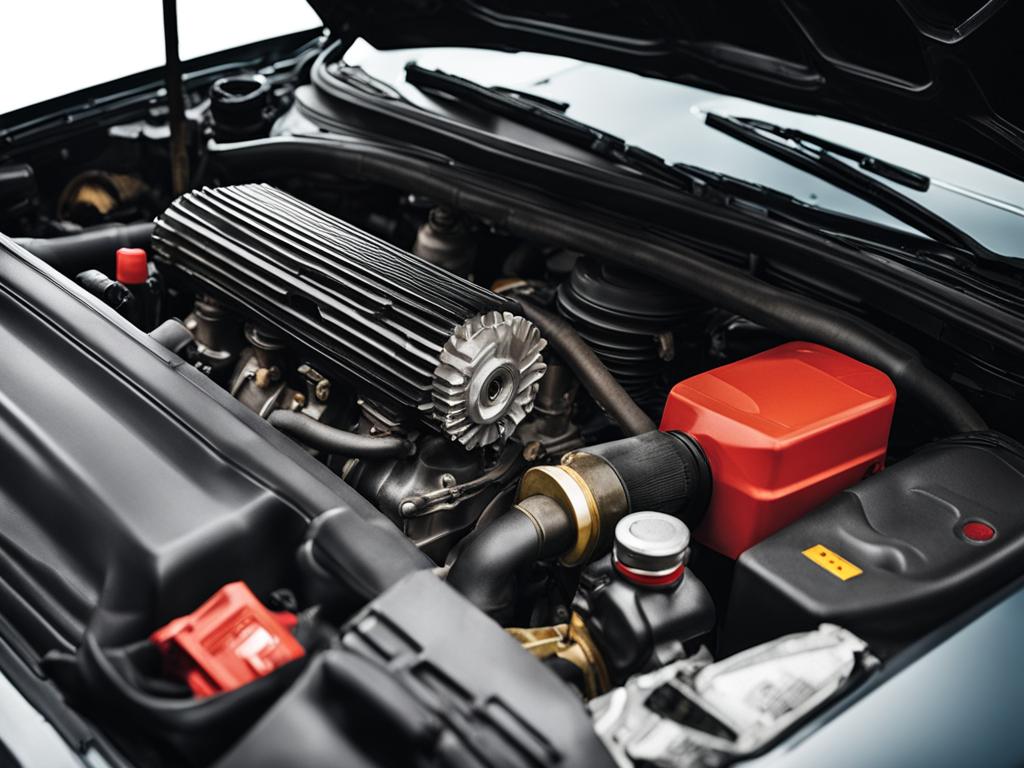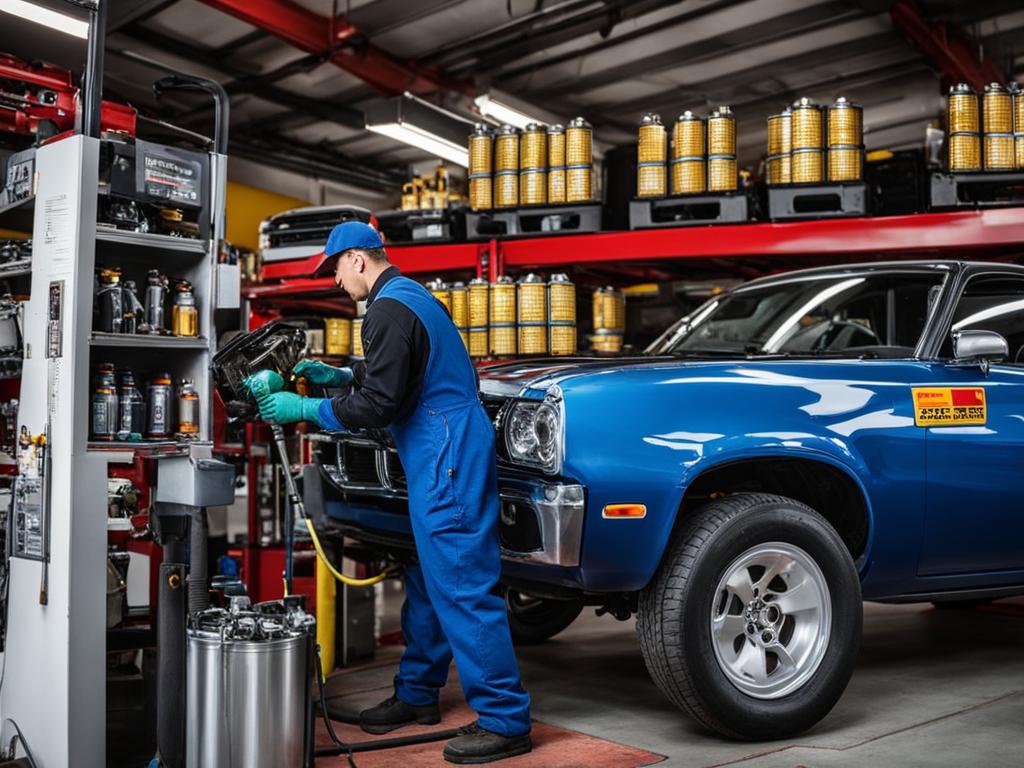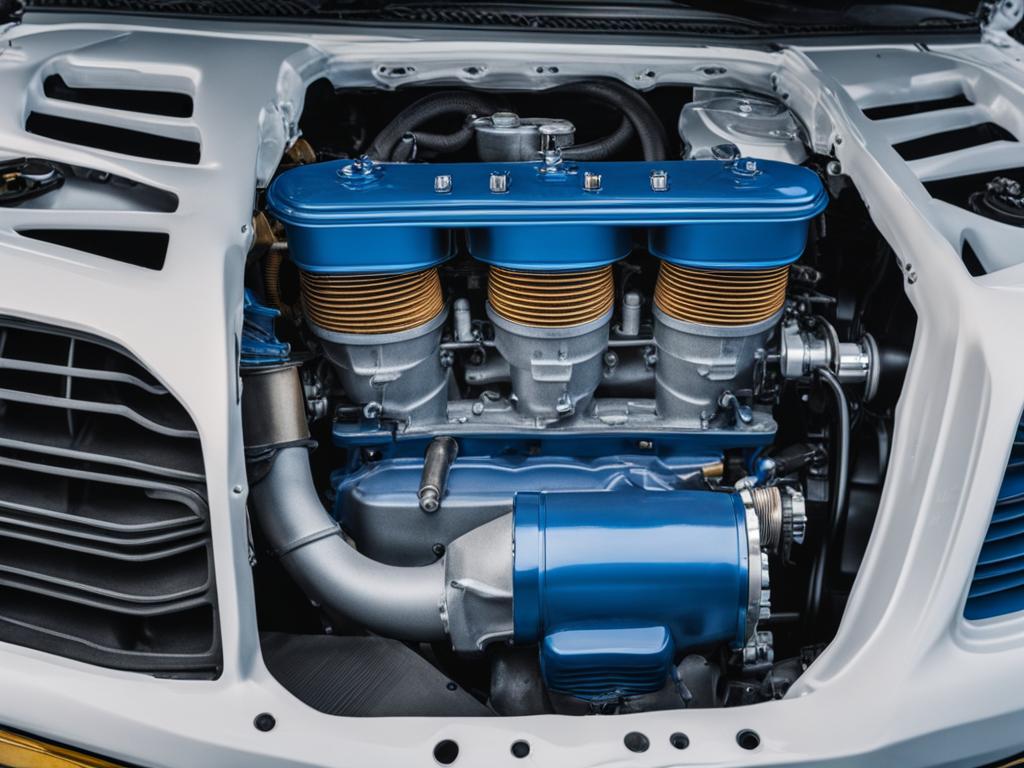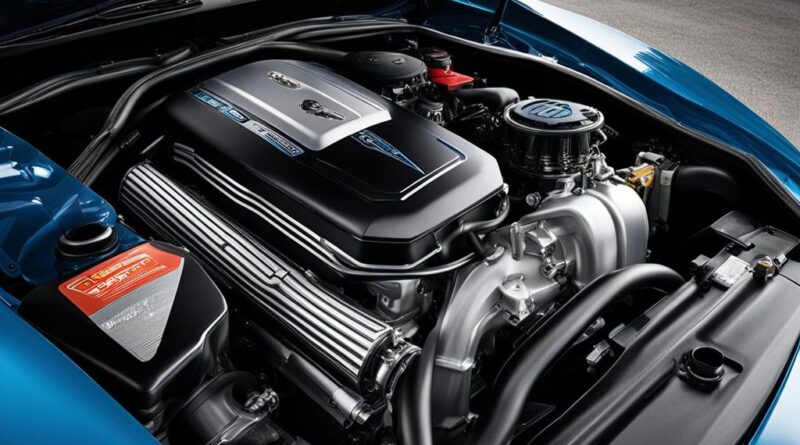Maximize Engine Health: Benefits of Oil Change
Performing regular oil changes is crucial for maintaining your vehicle’s engine health, performance, and lifespan. Consistently replacing the oil in your engine offers numerous benefits that go beyond simple maintenance.
One of the primary reasons to get regular oil changes is to protect your engine from damage. Engine components constantly move at high speeds, creating friction and heat. Fresh oil acts as a lubricant, reducing friction and minimizing wear and tear on these parts. When you change the oil, you remove contaminants that can build up and cause damage over time.
Regular oil changes also optimize fuel efficiency. Clean oil reduces friction, allowing the engine to run smoothly. This efficiency results in better mileage, saving you money at the pump. Additionally, maintaining the proper level of oil in the engine prevents overheating, ensuring optimal performance and preventing potential breakdowns.
Key Takeaways:
- Regular oil changes protect the engine, prevent damage, and optimize fuel efficiency.
- Fresh oil acts as a lubricant, reducing friction and minimizing wear and tear on engine components.
- Changing the oil removes contaminants, maintaining engine cleanliness.
- Clean oil reduces friction, optimizing fuel efficiency and enhancing performance.
- Maintaining the proper level of oil prevents overheating and potential breakdowns.
The Role of Motor Oil: Lubrication, Heat Dissipation, and Contaminant Removal
Motor oil plays a crucial role in maintaining the health and performance of your vehicle’s engine. It performs three key functions: lubrication, heat dissipation, and contaminant removal.
Lubrication: Motor oil acts as a lubricant, reducing friction between moving engine components. This helps prevent wear and tear, ensuring smooth operation and extending the life of the engine.
Heat Dissipation: Another important role of motor oil is heat dissipation. As the engine runs, it generates a significant amount of heat. Motor oil helps absorb and transfer this heat away from critical components, preventing overheating and potential damage.
Contaminant Removal: Motor oil also serves as a cleaning agent, removing contaminants and deposits that can accumulate in the engine over time. It traps dirt, metal particles, and other impurities, preventing them from causing damage or interfering with engine performance.
Regular oil changes are essential to maintain the proper function of motor oil. Over time, motor oil breaks down and loses its effectiveness, reducing its lubricating and cleaning abilities. By keeping up with regular oil changes, you ensure that your engine receives the optimal protection and performance from fresh motor oil.
By understanding the role of motor oil in lubrication, heat dissipation, and contaminant removal, you can appreciate the importance of regular oil changes in preserving your engine’s health and longevity.
The Importance of Oil Changes: Engine Health, Performance, and Efficiency
Regular oil changes play a crucial role in ensuring the optimal performance and longevity of your vehicle’s engine. Not only do they provide essential engine protection, but they also enhance performance, extend engine life, and reduce harmful emissions. Let’s explore how regular oil changes contribute to the overall health and efficiency of your engine.
Engine Protection
One of the primary benefits of regular oil changes is engine protection. Motor oil acts as a lubricant for the various moving parts within the engine, reducing friction and preventing excessive wear and tear. By maintaining a healthy oil level and quality, you can safeguard critical engine components from damage and potential breakdowns. This protection extends the life of your engine, saving you from expensive repairs in the long run.
Enhanced Performance
Another significant advantage of regular oil changes is the enhanced performance they provide. Clean and high-quality motor oil ensures that the engine operates smoothly and efficiently. It helps to optimize fuel combustion, providing more power to your vehicle. With improved performance, you’ll experience better acceleration, responsiveness, and overall driving experience.
Extended Engine Life
By prioritizing regular oil changes, you can significantly extend the life of your engine. Fresh oil reduces friction and heat buildup, preventing excessive strain on engine components. This reduces the risk of premature engine failure and helps your vehicle last longer. With proper care through oil changes, you can enjoy the benefits of a reliable and long-lasting engine.
Reduced Emissions
Oil changes also contribute to the reduction of harmful emissions. Over time, old oil can become contaminated with dirt, debris, and other harmful particles. By replacing the oil regularly, you ensure that the engine operates at its best, reducing the production of pollutants and minimizing your carbon footprint. Furthermore, reduced emissions not only benefit the environment but also help your vehicle comply with emissions regulations.
Regular oil changes are an essential part of vehicle maintenance. They provide crucial engine protection, enhance performance, extend engine life, and contribute to reduced emissions. By understanding the importance of oil changes and prioritizing them as part of your regular maintenance routine, you can enjoy a well-functioning, efficient, and long-lasting engine. Trust in the experts at Ramona Tire for professional oil change services and comprehensive vehicle maintenance.

| Benefits of Regular Oil Changes | |||
|---|---|---|---|
| Engine Protection | Enhanced Performance | Extended Engine Life | Reduced Emissions |
| Prevents damage to engine components | Improves acceleration and responsiveness | Reduces the risk of engine failure | Minimizes environmental impact |
| Optimizes fuel efficiency | Prolongs engine lifespan |
Types of Motor Oil: Conventional, Synthetic, and High-Mileage Options
When it comes to choosing the right motor oil for your vehicle, you have several options to consider. Understanding the differences between conventional oil, synthetic oil, and high-mileage oil can help you make an informed decision that best suits your needs.
Conventional Oil
Conventional oil, also known as mineral oil, is the most commonly used motor oil. It is derived from crude oil and undergoes basic refining processes. Conventional oil is affordable and suitable for low-mileage vehicles or those with simpler engine designs.
Synthetic Oil
Synthetic oil is a laboratory-engineered oil formulated to provide superior lubrication and performance. It is designed to withstand extreme temperatures and offer better protection against engine wear. Synthetic oil flows more easily at low temperatures, ensuring optimal engine performance during cold starts. It also lasts longer than conventional oil, reducing the frequency of oil changes needed.
High-Mileage Oil
High-mileage oil is specifically designed for vehicles with over 75,000 miles on their odometer. As vehicles age, engine seals may start to wear out, resulting in oil leaks and increased oil consumption. High-mileage oil contains additives that help condition and rejuvenate engine seals, reducing leaks and slowing down oil consumption. This specialized oil formulation also offers enhanced protection against engine wear in older vehicles.
Choosing the right motor oil for your vehicle depends on several factors such as your driving habits, vehicle age, and manufacturer recommendations. Consulting your vehicle’s owner’s manual or seeking advice from a professional mechanic can help you make an informed decision.
| Motor Oil Type | Key Features |
|---|---|
| Conventional Oil | Affordable Suitable for low-mileage vehicles Basic engine protection |
| Synthetic Oil | Superior lubrication Long-lasting Protects against engine wear Performs well in extreme temperatures |
| High-Mileage Oil | Designed for older vehicles Helps rejuvenate engine seals Reduces leaks and oil consumption Enhanced engine protection |
Hoover Automotive’s Expert Service: Partnering with Professionals
When it comes to maintaining your vehicle, quality and expertise matter. That’s why at Hoover Automotive, we pride ourselves on providing expert recommendations, timely service, quality assurance, and comprehensive vehicle maintenance. Whether you need an oil change or any other automotive service, you can trust our team of professionals to deliver exceptional results.
Our experienced technicians have the knowledge and skills to ensure that your vehicle receives the highest level of care. We understand the importance of regular oil changes in preserving engine health and maximizing performance. That’s why we are committed to providing top-notch service that goes above and beyond your expectations.
At Hoover Automotive, we offer a range of comprehensive vehicle maintenance services to keep your car running smoothly. From fluid checks and tire rotations to brake inspections and engine diagnostics, our team has you covered. We use state-of-the-art equipment and follow industry best practices to ensure that your vehicle receives the attention it deserves.
When you choose Hoover Automotive, you can have peace of mind knowing that your vehicle is in good hands. We take pride in delivering timely service that respects your busy schedule. Our goal is to get you back on the road as quickly as possible without compromising on quality.
Furthermore, our commitment to quality assurance means that we stand behind our work. We use only genuine, high-quality parts and products to ensure the longevity and performance of your vehicle. With Hoover Automotive, you can rest assured that your car is receiving the best care available.
Don’t just take our word for it. Hear what our satisfied customers have to say:
“Hoover Automotive has been my go-to place for all my vehicle maintenance needs. Their team is knowledgeable, friendly, and always provides timely service. I trust them completely with the care of my car.” – Sarah W.
I’ve been getting my oil changes at Hoover Automotive for years, and I wouldn’t go anywhere else. Their attention to detail and commitment to quality are unmatched. I highly recommend them!” – Mike D.

Customer Testimonials:
- Sarah W.: “Hoover Automotive has been my go-to place for all my vehicle maintenance needs. Their team is knowledgeable, friendly, and always provides timely service. I trust them completely with the care of my car.”
- Mike D.: I’ve been getting my oil changes at Hoover Automotive for years, and I wouldn’t go anywhere else. Their attention to detail and commitment to quality are unmatched. I highly recommend them!”
Our Comprehensive Vehicle Maintenance Services:
| Service | Description |
|---|---|
| Fluid Checks | Regular inspection and replenishment of vital fluids to maintain optimal performance. |
| Tire Rotations | Periodic rotation of tires to ensure even tread wear and extend tire life. |
| Brake Inspections | Thorough evaluation of the braking system for safe and reliable stopping power. |
| Engine Diagnostics | Advanced diagnostic technology to identify and resolve engine-related issues. |
Understanding the Types of Oil That Cars Use
When it comes to keeping your car’s engine running smoothly, choosing the right type of oil is essential. There are three main types of oil commonly used in cars, each with its own unique benefits and characteristics. Let’s take a closer look at these types and what sets them apart.
1. Conventional Oil
Conventional oil, also known as mineral oil, is the most traditional type of motor oil. It is derived from crude oil and undergoes a refining process to remove impurities. Conventional oil provides adequate lubrication and protection for most everyday driving conditions. It offers a balance between cost-effectiveness and performance, making it suitable for vehicles with standard engine requirements.
2. Synthetic Blend Oil
Synthetic blend oil is a mixture of conventional oil and synthetic oil. It combines the affordability of conventional oil with the enhanced performance and protection of synthetic oil. Synthetic blend oil offers improved resistance to heat and oxidation, providing better lubrication for high-stress driving conditions or towing. It is a popular choice for drivers who want the benefits of synthetic oil without the higher price tag.
3. Synthetic Oil
Synthetic oil is a man-made product that is engineered to provide superior performance and protection. It is formulated with advanced additives and refined base oils, ensuring optimal lubrication and reduced friction. Synthetic oil offers improved resistance to extreme temperatures, better engine cleanliness, and extended oil change intervals. It is highly recommended for high-performance, turbocharged, or luxury vehicles.
Choosing the right type of oil for your car depends on factors such as your driving habits, vehicle age, and manufacturer recommendations. Consulting your owner’s manual or seeking advice from a trusted automotive professional can help you make an informed decision.
“Selecting the appropriate oil type is crucial for maintaining the longevity and performance of your car’s engine.” – Hoover Automotive
How Often To Get Your Oil and Filter Changed
The frequency of oil changes depends on the type of oil used. It is important to follow the recommended service intervals to ensure optimal engine performance and longevity.
Conventional oil: Conventional oil should be changed every 3,000 to 5,000 miles. This type of oil is affordable and commonly used in vehicles with lower mileage.
Synthetic blend oil: Synthetic blend oil can last longer than conventional oil and is recommended to be changed every 5,000 to 7,500 miles. It offers a balance between performance and affordability.
Full synthetic oil: Full synthetic oil provides the highest level of engine protection and can last up to 10,000 to 15,000 miles before needing to be changed. It is the most expensive but offers superior performance and extended service intervals.
Expert Tip:
- Check your vehicle’s owner’s manual for the manufacturer’s specific recommendations on oil change intervals.
- Consider factors such as driving conditions, climate, and the age of your vehicle when determining the appropriate oil change frequency.
- Regularly inspect your oil filter and replace it during each oil change to maintain optimal engine health.
By adhering to the recommended oil change service intervals and using the appropriate type of oil, you can ensure your engine stays clean, lubricated, and protected for years to come.

How To Know What Type of Oil Your Car Takes
Consulting your vehicle’s owner’s manual is the best way to determine the recommended oil type and viscosity for your car. The owner’s manual provides specific instructions from the manufacturer regarding the type of oil that is compatible with your vehicle’s engine.
Since different car models and engines have unique requirements, it is essential to follow the guidelines outlined in the owner’s manual. The manual will specify whether your vehicle requires conventional oil, synthetic oil, or a specific high-mileage oil.
Owner’s manuals typically include the following information:
- The recommended oil type (conventional, synthetic, or high-mileage)
- The recommended oil viscosity (thickness)
- The oil capacity of the engine
- Any additional specifications or recommendations for oil changes
By relying on the owner’s manual, you can ensure that you use the right type of oil and maintain optimal engine performance and longevity. Following the manufacturer’s guidelines will help prevent potential damage to the engine and keep your vehicle running smoothly.
Remember, it’s important to consult your owner’s manual for accurate information about your specific vehicle.
Here’s an example of an owner’s manual page that provides details on oil type and viscosity:
| Vehicle Model | Recommended Oil Type | Recommended Oil Viscosity |
|---|---|---|
| Toyota Camry | Synthetic Blend | 5W-30 |
| Honda Accord | Full Synthetic | 0W-20 |
| Ford F-150 | Conventional | 5W-20 |

Trust Ramona Tire for Your Oil Change
When it comes to getting your oil changed, you want to ensure that you’re entrusting your vehicle to professionals who provide quality service and use high-quality oil and filters. That’s where Ramona Tire comes in. With their expertise in auto repair and commitment to customer satisfaction, you can rely on Ramona Tire for all your oil change needs.

Ramona Tire offers professional oil change services that go beyond just replacing the oil in your vehicle. They understand the importance of using top-notch products to maximize engine performance and longevity. That’s why they only use quality oil and filters to ensure the best results for your vehicle.
But it doesn’t stop there. Ramona Tire also provides additional savings through oil change coupons, allowing you to maintain your vehicle’s health without breaking the bank. These coupons make it easier for you to get the routine maintenance your car needs at an affordable price.
And if your vehicle needs more than just an oil change, Ramona Tire has got you covered. With their comprehensive auto repair services, they can address any additional issues your vehicle may have, ensuring a smooth and worry-free driving experience.
When it comes to maintaining your vehicle’s engine health, trust the experts at Ramona Tire. With their commitment to quality, professionalism, and customer satisfaction, you can feel confident that your oil change needs will be taken care of with the utmost care and expertise.
The Impact of Oil Changes on Engine Health
Regular oil changes play a crucial role in maintaining the health and longevity of your vehicle’s engine. By preventing engine wear and tear, maintaining engine cleanliness, improving fuel efficiency, protecting against corrosion, and prolonging engine life, oil changes help ensure optimal performance and reliability.
Preventing Engine Wear and Tear
Over time, the engine oil in your vehicle becomes contaminated with dirt, debris, and metal particles. This contamination can cause abrasive wear on engine components, leading to increased friction, heat, and potential damage. Regular oil changes flush out these contaminants and provide fresh, clean oil that lubricates the engine properly, reducing wear and tear on vital components.
Maintaining Engine Cleanliness
Engine cleanliness is essential for optimal performance. As oil circulates through the engine, it collects and suspends harmful deposits, preventing them from adhering to internal engine surfaces. Regular oil changes ensure that the engine remains clean and free from sludge, varnish, and other harmful deposits that can impede performance and cause damage.

Improving Fuel Efficiency
A clean and properly lubricated engine operates more efficiently, resulting in improved fuel economy. Fresh oil reduces friction between metal components, allowing them to move smoothly and effortlessly. This reduces the strain on the engine, enabling it to deliver better fuel efficiency and maximize the mileage you get out of every gallon of fuel.
Protecting Against Corrosion
Engine corrosion can lead to serious damage and expensive repairs. Regular oil changes help protect against corrosion by providing a fresh, protective layer of oil that prevents moisture and corrosive agents from coming into contact with the engine’s metal surfaces. This safeguard helps maintain the structural integrity of the engine and extends its overall lifespan.
Prolonging Engine Life
By preventing wear and tear, maintaining cleanliness, improving fuel efficiency, and protecting against corrosion, regular oil changes contribute to extending the life of your engine. A well-maintained engine is less likely to experience costly breakdowns and premature failures, ensuring a longer and more reliable lifespan for your vehicle.
When to Change Your Oil
The frequency at which you should change your oil depends on various factors, including manufacturer recommendations, driving habits, climate, oil type, and oil analysis. It is essential to consult your vehicle’s owner’s manual for specific guidelines tailored to your car.
Manufacturer Recommendations
Manufacturers often provide recommended oil change intervals based on factors such as the type of engine, oil capacity, and driving conditions. Adhering to these guidelines helps ensure optimal engine performance and longevity.
Driving Habits
Your driving habits play a crucial role in determining how frequently you should change your oil. If you primarily drive in severe conditions, such as heavy traffic, frequent short trips, or extreme temperatures, it is advisable to change your oil more frequently.
Climate
The climate in which you drive also affects the oil change frequency. In hot climates or regions with high humidity, oil may deteriorate more quickly and require more regular changes to maintain optimal performance.
Oil Type
The type of oil you use, whether it’s conventional, synthetic blend, or full synthetic, can influence the recommended oil change interval. Synthetic oils often have superior performance and longer-lasting properties, allowing for extended oil change intervals compared to conventional oils.
Oil Analysis
Oil analysis involves testing a small sample of the oil to evaluate its overall condition and determine if it is still effective in protecting the engine. This analysis can provide valuable insights into the health of your engine and help determine when to change the oil.
By considering these factors and staying informed about your specific vehicle’s recommendations, you can ensure that your oil changes are done at the appropriate intervals. Regular oil changes are crucial for maintaining engine health, preventing damage, and optimizing fuel efficiency.

Conclusion
Regular oil changes are essential for maintaining engine health and prolonging the life of your vehicle’s engine. By understanding the importance of oil changes and partnering with professionals, you can maximize the benefits and longevity of your engine.
One of the key benefits of regular oil changes is the protection they provide to your engine. Fresh oil keeps engine components lubricated, reducing friction and preventing wear and tear. This not only improves engine performance but also helps to extend its overall lifespan.
In addition to engine protection, regular oil changes also optimize fuel efficiency. Clean oil allows the engine to operate smoothly, reducing friction and maximizing fuel combustion. This not only helps you save money at the pump but also contributes to a cleaner environment by reducing emissions.
To ensure your engine remains in peak condition, it is important to adhere to the recommended oil change intervals and use the appropriate oil type for your vehicle. Consult your owner’s manual for guidance on the ideal oil change frequency and the recommended oil specifications.
FAQ
What are the benefits of getting regular oil changes?
Regular oil changes help maintain engine health, improve performance, extend engine life, and reduce harmful emissions.
What is the role of motor oil in a vehicle?
Motor oil lubricates engine components, dissipates heat, and removes contaminants, ensuring proper engine function and reducing wear and damage.
Why are oil changes important for engine health, performance, and efficiency?
Oil changes provide engine protection, enhance performance, extend engine life, and improve fuel efficiency while reducing harmful emissions.
What are the different types of motor oil available?
There are three main types of motor oil: conventional oil, synthetic blend oil, and synthetic oil, each offering different levels of protection and longevity.
Why should I choose Hoover Automotive for oil change services?
Hoover Automotive offers expert recommendations, timely service, quality assurance, and comprehensive vehicle maintenance for oil changes and other needs.
What are the types of oil that cars use?
The types of oil include conventional oil, synthetic blend oil, and synthetic oil, each with its own advantages and characteristics.
How often should I get my oil and filter changed?
The frequency of oil changes depends on the type of oil used, with conventional oil typically changed every 3,000 to 5,000 miles, and synthetic oils having longer intervals.
How can I determine what type of oil my car takes?
Consult your vehicle’s owner’s manual to determine the recommended oil type and viscosity for your specific car model.
Why should I trust Ramona Tire for my oil change?
Ramona Tire provides professional oil change services with high-quality oil and filters, additional savings through oil change coupons, and also offers auto repair services.
What is the impact of oil changes on engine health?
Regular oil changes prevent engine wear and tear, maintain engine cleanliness, improve fuel efficiency, protect against corrosion, and prolong engine life.
When should I change my oil?
The frequency of oil changes depends on manufacturer recommendations, driving habits, climate, oil type, and oil analysis. Consult your owner’s manual for specific guidelines.




